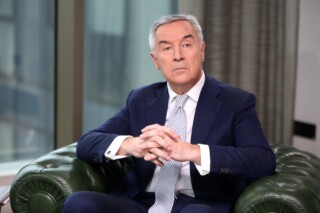Prof. Dr. Nadežda Basara, a world-renowned expert in healing the most serious diseases, has performed 2,200 transplant surgeries so far, and her patients like to say “When Nadežda carries out a surgery, you can’t die“. In an interview with Dnevne Novine daily, she tackled the treatment methods, her way of working with patients, stem cell treatments which are her main area of expertise, as well as her ties with Montenegro.
The application of modern protocols and the latest scientific achievements in the field of hematology and oncology, according to her, are key to success. Ms Basara does not accept when some people say “the medicine is not on the list.”
“If I happen to know that there are medicines that can help my patients, I do everything I can to get it for free as part of the clinical studies, and I’ve never had problems so far,“ she noted.
Here are the highlights of the interview with Ms Basara …
VN: You are one of the winners of the state recognition of Montenegro awarded to the prominent members of diaspora, individuals and organizations. You received a prize for a contribution in the field of science. What does the prize awarded by Montenegro mean to you?
BASARA: It represents a new stimulus, new energy and desire to help my colleagues from Montenegro to heal as many patients with hemato/oncological diseases with my acquired knowledge and experience.
…
VN: Your name is known worldwide, the public has had the opportunity to learn about your successes not only through information in scientific circles, but also through the experience of your patients about which there is a lot of stories in the media. How and when did cooperation with Montenegro come about?
BASARA: Cooperation began in late 2014, when I had a surprise call by Ms. Novak who was working in the Health Insurance Fund of Montenegro. She begged me to start carrying out stem cell transplant surgeries, mostly for young patients from Montenegro, because no one sent to the clinics outside Montenegro returned to the country! You know what that means! Although the Health Insurance Fund was already familiar with my successful transplant surgeries, there were also some Montenegrin self-financing patients, and I asked them to come and see how I work and then make an agreement.
…
VN: And how would you describe your cooperation today?
BASARA: Unfortunately, the Montenegrin healthcare system changed its policy already next year, the achieved worldwide success of over 90 percent successful transplant surgeries got forgotten and patients were sent back to other clinics.
VN: The major area of your expertise is stem cell treatment. Why stem cells? What diseases can be cured by stem cell transplantation? Do you have a record of how many patients have been cured by stem cell transplantation?
BASARA: Stem cells are the most powerful and most capable cells in our body. Stem cells have the ability to self-renew, that is, when the stem cell is divided, one immediately “hides” in its “niche or bunker” located in the bone marrow, so the cytostatic cannot destroy it. They also have the ability to further divide and mature and thus make different blood cells. When they become leukemia stem cells, the only applicable method that can cure them is to replace them with the healthy stem cells that are immunologically powerful and can fight against the hidden and diseased stem cells.
Malignant diseases that are treated with stem cells are: leukemia, lymphoma, myeloma, myelodysplastic syndromes, but also benign and severe hematological diseases, such as aplastic anemia or thalassemia.
So far, I have carried out more than 2,200 transplant surgeries in three centers in Germany, of which 1,900 were from the unrelated donors.
…
VN: How many patients did you have from Montenegro? What is the situation in Montenegro and the region when it comes to malignant diseases?
BASARA: I certainly had over 30 patients with malignant diseases from Montenegro. I don’t know the number of malignant diseases in Montenegro, but I suppose it is similar to other European countries.
…
VN: The public knows a lot about you as a world-class expert. But your biography is very interesting. Who is Prof. Dr. Nadežda Basara? Is it true that you originated from Crmnica? What are your links with Montenegro? Are your future plans related to deeper cooperation with our country?
BASARA: Prof. Dr. Nadežda Basara was born Ivović, and her father was Dr. Hrvoje Ivović, a surgeon from Berane. Her grandfather was Jovan Ivović, born in Gornji Seoci, a professor of philosophy and director of the Gymnasium in Berane and Danilovgrad and the Order of St. Sava bearer. Her great grandfather was Djuro Ivovic, a judge in Cetinje and Bar and he was also born in Gornji Seoci. My connections with Montenegro and my Montenegrin family are inseparable and I’m willing to further cooperate with Montenegro as was the case in the past.




